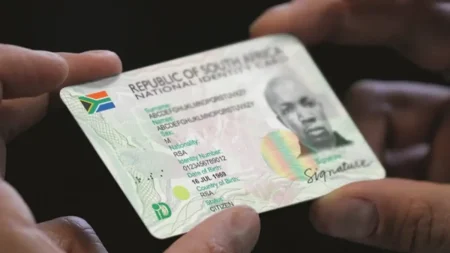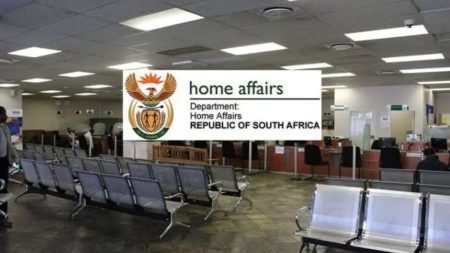The South African Department of Home Affairs (DHA) has announced the much-anticipated upgrade of its digital verification system. The overhaul, which aims to boost both national security and improve public and private sector services, is a vital move in the country’s digital transformation agenda. This upgrade will impact various sectors, enabling more efficient identity verification through advanced biometric technology.
The new system will roll out on April 1, with a significant focus on reducing service delays and enhancing user experience.
The Importance of the Digital Verification System
The Department of Home Affairs’s digital verification system plays a crucial role in verifying identities against the national population register. This system is used by several government departments, including the National Treasury and the South African Social Security Agency (SASSA), as well as private sector entities, particularly in the financial services sector. By using biometric data such as fingerprints and facial recognition, this system can verify the identity of a person in a highly secure and efficient manner.
The Minister of Home Affairs, Dr. Leon Schreiber, has described the upgrade as a landmark moment for the DHA and the country. Schreiber noted, “The rollout of a reliable, efficient, and secure verification service supports both the public and private sectors to improve service delivery.” He highlighted that this upgrade would significantly reduce waiting times, which have previously been a point of frustration for citizens needing to verify their identity, whether for social grants, banking, or other essential services.
Related: Book Your Home Affairs Appointment Online – Fast, Easy & Hassle-Free!
A Critical Step in South Africa’s Digital Transformation at The Department of Home Affairs
The rollout of the upgraded digital verification system is part of the larger digital transformation agenda outlined by President Cyril Ramaphosa in his State of the Nation Address. Schreiber emphasized that the reformed verification system is an essential part of delivering on the vision for a secure and efficient population register. This is particularly important as South Africa moves toward establishing a digital ID system, which will streamline access to services and ensure security for all citizens.
Despite its potential, the old verification system faced significant challenges. Users often experienced frustrating delays, with verification responses taking up to 24 hours. Additionally, the system had an alarmingly high failure rate, with errors as high as 50%, leading to long manual verification processes and diminished user confidence.
Schreiber acknowledged these setbacks, stating that the department had taken substantial steps to resolve the issues and ensure that the new system provides a more reliable service. “This investment in our population register is not only overdue but also critical for the vision of digital ID,” he said.
What Changes Will the Upgrade Bring?
The new system promises a marked improvement over the previous one, addressing the delays and errors that hindered the verification process. The upgraded service will operate at much faster speeds, with response times drastically reduced. Tests have shown that the error rate of the new system is well below 1%, offering greater accuracy and efficiency for users.
The speed of the verification process is one of the most significant improvements. Users will no longer need to wait for up to a day for identity verification, and the likelihood of errors has been drastically reduced. This change is expected to be a game-changer, particularly for those applying for social grants, opening bank accounts, or engaging with other government services that require identity verification.
Costs for the Private Sector
While the new system brings improved services for both the public and private sectors, there will be a cost attached to its use for companies in the private sector. From April 1, businesses, particularly those in the financial sector, will be required to pay a fee for utilizing the DHA’s verification service. The fees are part of the Department’s plan to ensure the sustainability of the upgraded system. However, the public sector—including government departments and agencies—will remain exempt from these charges, continuing to benefit from the service without incurring additional costs.
The introduction of these fees for private sector companies is seen as an effort to ensure that the system remains financially viable while supporting the broader goal of digital transformation. The department has reassured the public and businesses that the fees will be kept at a reasonable level, considering the improvements in speed and accuracy that the new system brings.
Expected Impact on Service Delivery
The new verification system will undoubtedly have a significant impact on service delivery in South Africa. For citizens, the most noticeable change will be the speed with which they can access essential services. Whether applying for a social grant from SASSA or opening a bank account, individuals will now experience faster and more accurate identity verification.
In the public sector, government departments will be able to process applications more efficiently, reducing waiting times and improving the overall user experience. This is particularly crucial in services related to social welfare, as many South Africans rely on these programs for financial support.
For businesses, particularly those in the financial and healthcare sectors, the improved system will offer a more secure and efficient means of verifying identities. This could reduce the risks associated with fraud and identity theft, which have been ongoing challenges for South African businesses.
Looking Ahead: The Future of Digital Identity in South Africa
The upgrade to the Department of Home Affairs’s verification system marks a significant milestone in South Africa’s journey toward a more digital, secure, and efficient public service system. With the backing of the national government, the DHA’s efforts align with broader trends in digital identity systems worldwide. The eventual goal is to roll out a comprehensive digital ID system that can be used across various platforms and services, ensuring seamless access to government services and private sector offerings.
The enhanced verification system, coupled with the drive for digital ID, promises to enhance the lives of South Africans by offering greater convenience, faster services, and improved security. However, the success of this initiative will depend on continued investment in technology, public awareness, and ensuring that the system remains inclusive and accessible for all citizens.
The announcement by the Department of Home Affairs regarding the upgrade of the digital verification system represents a major step forward for South Africa in its push for a more efficient, secure, and digital future. By improving the accuracy and speed of identity verification, the system will streamline access to vital services for both individuals and businesses. The introduction of fees for the private sector is necessary to maintain the service’s viability, though public sector agencies will continue to benefit without incurring costs.
As the Department of Home Affairs continues its journey of digital transformation, South Africa stands at the threshold of a new era in public service delivery, one that prioritizes security, efficiency, and convenience for all.
Source: IOL










